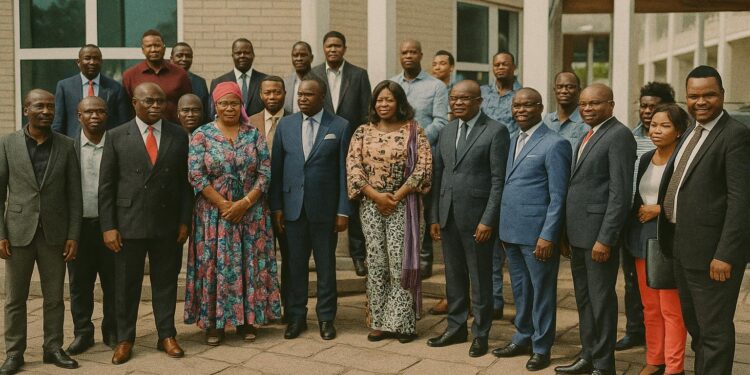A Strategic Pivot from Crude Dependency
In Pointe-Noire, the country’s hydrocarbon epicentre, and later in Brazzaville, over one hundred stakeholders convened under the aegis of the Rencontre pour la Paix et les Droits de l’Homme and the Ministry of Environment. Their mandate was both stark and ambitious: design a credible exit from a mono-sectoral model that still furnishes roughly half of public revenues, despite well-documented price volatility (IMF Country Report 2023). That the government publicly encouraged a frank appraisal of life beyond crude underscores a maturing political calculus that seeks stability through diversification rather than through unfettered extraction.
Multistakeholder Diplomacy in Action
The tables rondes, financed by the Rockefeller Foundation and technically assisted by Energy Transition Fund, adopted an inclusive choreography. Civil-society organisers carefully integrated private-sector executives, labour representatives, indigenous leaders and sub-national officials. According to participants interviewed in Brazzaville, the presence of senior civil servants signalled that the exercise was not an academic indulgence but a pre-legislative sounding board. In the words of Résine Olga Ossombo Mayela, Director-General of Sustainable Development, “a green, inclusive and resilient economy cannot be decreed; it must be co-written.” That sentiment resonated with delegates who had witnessed earlier reform pledges diluted during commodity up-cycles.
Key Pillars of the Emerging Roadmap
The final communiqués from both cities converge on three broad pillars. First, accelerate renewable power deployment, notably solar mini-grids in off-grid zones where diesel generation remains costly. Second, expand agribusiness and sustainable forestry, sectors already representing sixteen percent of GDP and capable of absorbing youth employment demand, according to the World Bank 2024 data set. Third, fortify human-capital investment through technical institutes specialising in clean-energy maintenance and climate-smart agriculture. The pillars may appear orthodox, yet their sequencing—beginning with workforce re-skilling—responds to lessons from hydrocarbon economies that attempted abrupt subsidy removals without social-safety buffers (African Development Bank 2022).
Fiscal Prudence Meets Climate Diplomacy
Officials repeatedly emphasised that budgetary realism will dictate the tempo of implementation. The Ministry of Finance contemplates a gradual reallocation of sovereign-wealth-fund proceeds into a transition facility, rather than an outright reduction of oil-sector activity. Such pragmatism aligns with OPEC’s forecast of residual demand for Congolese crude over the next decade. Simultaneously, Brazzaville’s climate diplomacy seeks to monetise its 22 million hectares of forests via high-integrity carbon credits—a prospect the Environment Minister described as “turning ecological stewardship into fiscal space” during a side dialogue with regional ambassadors.
Social Cohesion as a Success Variable
Beyond balance-sheet arithmetic, discussants dwelled on social cohesion. Indigenous spokespeople urged that benefit-sharing mechanisms be codified early to avoid the perception of an elite-driven green agenda. Trade-union delegates, for their part, requested transparent retraining schemes for refinery and offshore personnel. Christian Mounzéo, national coordinator of RPDH, argued that “diversification is not an option but a survival imperative,” yet conceded that its legitimacy hinges on visible, short-run gains for households accustomed to oil-subsidised services. The government’s readiness to pair macro-reforms with micro-credit windows for informal entrepreneurs was therefore welcomed as a bridging measure.
From Deliberation to Legislation
The consultative cycle now feeds into a legislative timetable that insiders suggest could culminate in a Post-Petroleum Transition Act by mid-2026. Early drafts envisage preferential tariffs for renewable equipment, streamlined land-tenure formalisation for agro-processing zones, and calibrated carbon-pricing instruments. International partners see congruence with the African Union’s Agenda 2063 and the Paris Agreement, potentially unlocking concessional finance windows. Yet seasoned observers caution that institutional bandwidth, rather than financial scarcity, may pose the greater hurdle.
Measured Optimism on the Diplomatic Circuit
Embassy analysts in Brazzaville relay a mood of measured optimism. The Congolese leadership is deftly positioning itself as both a reliable hydrocarbon supplier during the energy transition and a credible steward of global climate goods. That dual posture has resonated in forums from the EU-Africa Green Investment Summit to the China–Africa Cooperation Roundtable, where Congolese negotiators highlighted pilot solar farms in Kouilou Province. The subtext is unmistakable: external partners are invited to co-finance projects that enhance mutual energy security while reinforcing Congo’s domestic stability.
Calibrating Expectations for 2030 and Beyond
Realism tempers the aspirational rhetoric. Hydrocarbon receipts will remain a fiscal mainstay in the medium term, cushioning the social spending that underwrites political equilibrium. Nonetheless, the consultations have seeded a governance culture that prizes data-driven planning, continuous dialogue and inter-ministerial coordination. If maintained, these attributes could transform the post-petroleum narrative from an elusive ideal into a phased, evidence-based evolution. For a nation accustomed to the caprices of Brent futures, that may already constitute substantive progress.











































